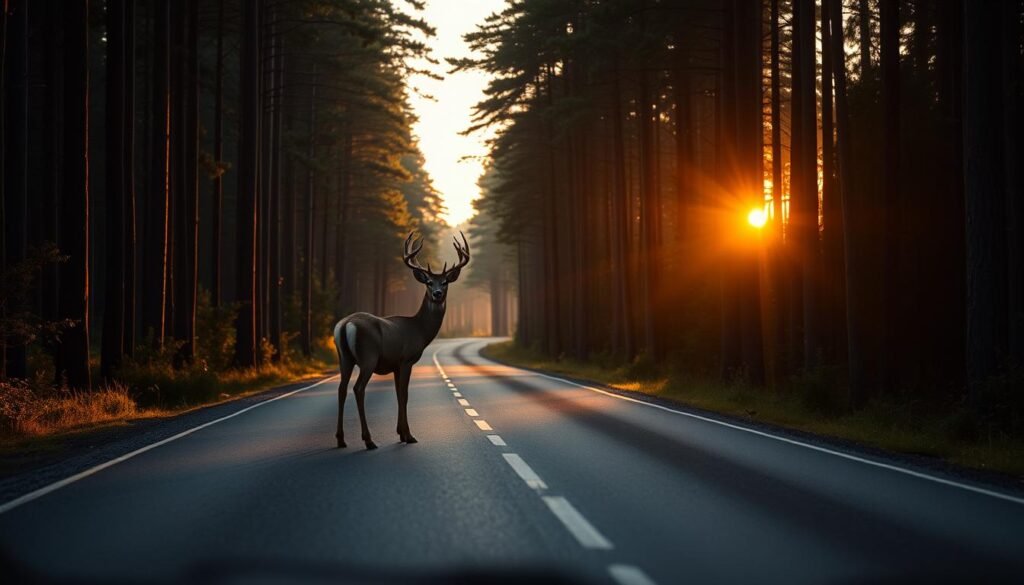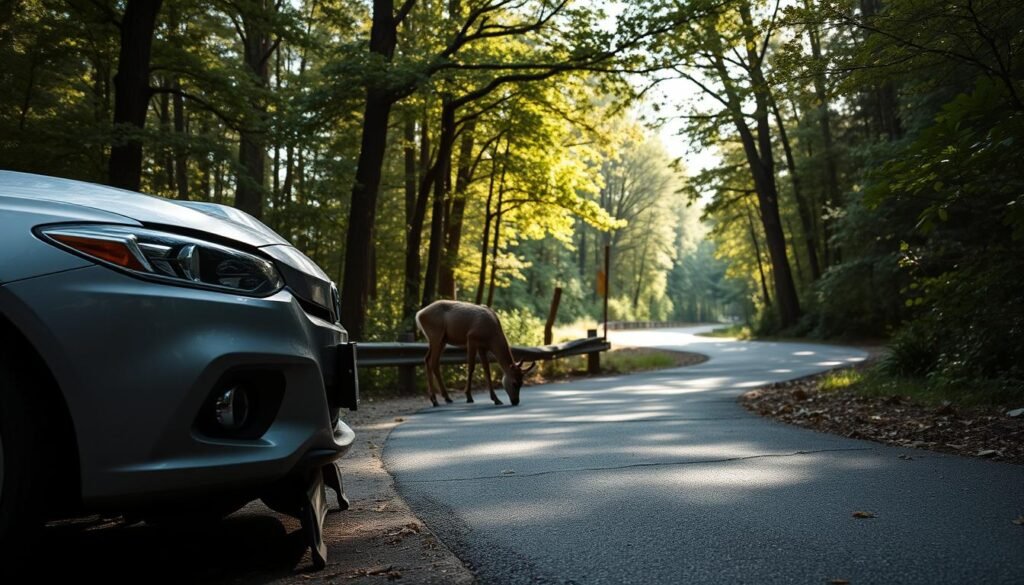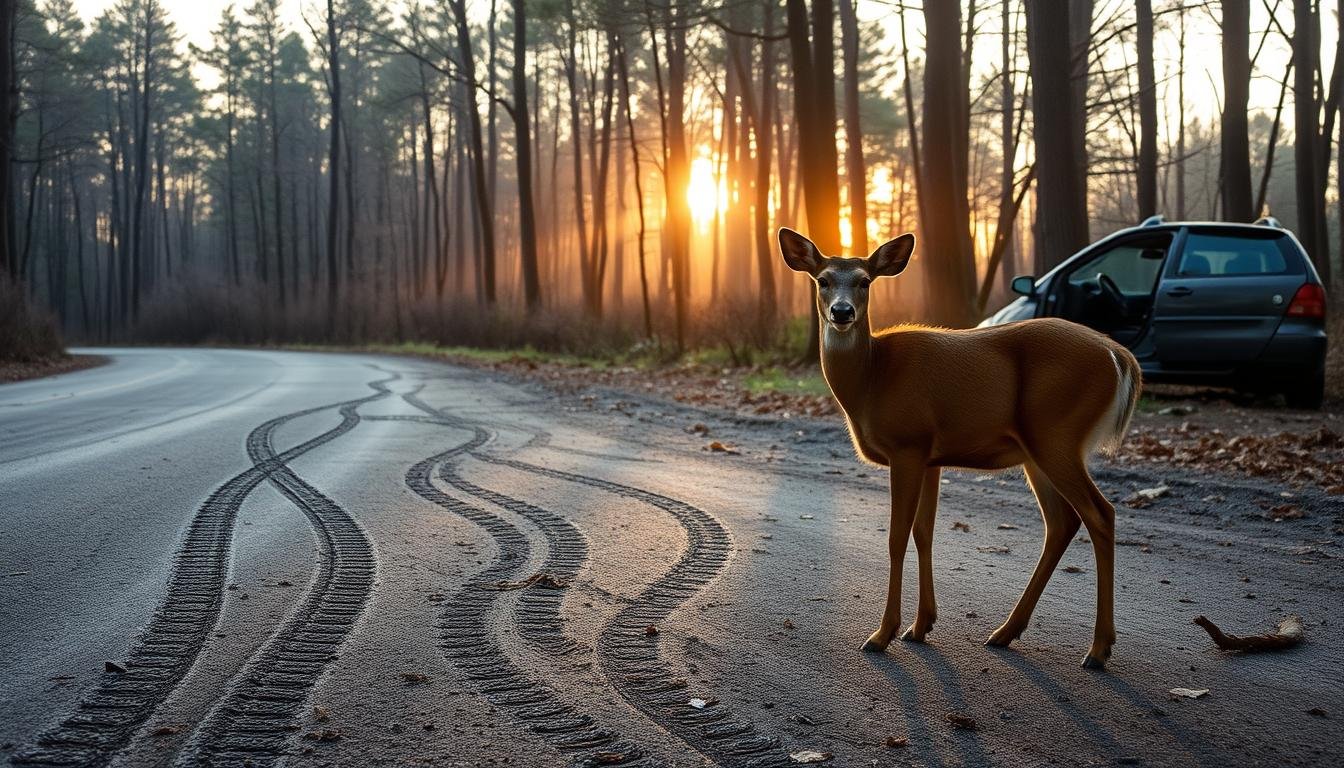If you’ve hit a deer while driving, you might wonder how fast you must tell your insurance. The answer varies by state and company. But, telling them quickly is best. It makes sure your claim is handled fast and you get the help you need.
The important step is to act fast after hitting a deer. This means calling the police, documenting what happened, and telling your insurance. You usually have about 10 days to report the accident. If you don’t, it could make things harder or even stop your claim.
The exact time to report changes, but acting fast and right is best. By documenting the incident and telling your insurer, you help make sure your claim goes smoothly. Always put your safety and car’s safety first after hitting a deer.
Key Takeaways
- There is no universal timeline for reporting a deer collision to your insurance provider.
- Prompt reporting, often within 10 days, is typically recommended to ensure a smooth claims process.
- Failing to report the accident in a timely manner could potentially result in complications or jeopardize your claim.
- Take immediate action after the collision, including contacting the police and documenting the incident.
- Your safety and protecting your vehicle should be the top priorities after a deer-related accident.
What to do if you hit a deer
Hit a deer while driving? It’s a shock and can feel overwhelming. But, knowing what to do next is key. It’s important to follow the right steps, especially when dealing with insurance claims. This ensures your claim goes smoothly and you get coverage for damages.
Common questions about hitting a deer
Many people have questions after hitting a deer. Let’s look at some common ones:
Do you have to call the police if you hit a deer?
Yes, in many places like Indiana, calling the police is a good idea. It helps document the incident and makes insurance claims easier. Plus, the police can move the deer off the road to prevent more accidents.
Do you have to pay a deductible if you hit a deer?
Yes, you’ll likely pay a deductible if you hit a deer with comprehensive coverage. Deductibles can be $100 to $2,000. Check your policy to see how much you’ll pay.
| Key Considerations | Details |
|---|---|
| Comprehensive Coverage | Covers damage from hitting an animal, like a deer. |
| Full Coverage | This means you have collision, comprehensive, and liability coverage. |
| Medical Benefits Coverage | Helps pay for injuries from hitting a deer. |
| Deer-Related Accidents Reporting | Some places require drivers to report hitting wildlife. |
What you do after hitting a deer matters a lot. Following the right steps helps with claims and getting a good outcome. Make sure to follow the right procedures, file your claims, and know your insurance policy well.
Is hitting a deer covered by comprehensive or collision coverage?
If you hit a deer with your car, you might wonder if your insurance will help. The good news is, damage from a deer collision is usually covered by comprehensive, not collision insurance.
Comprehensive coverage helps protect your car from things like hitting a deer. So, if your car hits a deer, fixing it might be covered by your comprehensive policy. You’ll have to pay your deductible first.
If you try to avoid a deer and hit something else, that’s a collision. Then, your collision coverage would kick in. Always check your insurance to see what happens in a deer accident.
| Coverage Type | Applies to Deer Collision |
|---|---|
| Comprehensive | Yes, covers damage from direct deer impact |
| Collision | No, covers collisions with other vehicles or objects |
Knowing the difference between comprehensive and collision coverage is key. It helps you understand what you’ll pay for repairs after hitting a car accident involving deer. Remember, a deer collision insurance claim usually goes under comprehensive coverage. Always check your policy with your insurance company.

“Over 200 Americans are killed and over 10,000 are injured in car accidents involving deer each year according to the National Highway Traffic Safety Administration.”
Are injuries from a deer accident covered?
If you get into a deer accident, your auto insurance can help. It covers injuries with personal injury protection (PIP) coverage or medical payments coverage. These cover your medical bills from the accident.
Your car insurance also covers car damage. But for medical costs, your auto policy’s injury cover steps in. Always give your health insurance info to your doctors. Your car insurance might not pay for everything.
Having good auto and health insurance is key after a deer accident. This deer accident injuries coverage is a big help when you’re hurt. It makes sure you’re covered financially.
| Coverage Type | What It Covers |
|---|---|
| Comprehensive | Damage to your vehicle from hitting a deer |
| Personal Injury Protection (PIP) | Medical expenses and lost wages for you and your passengers |
| Medical Payments Coverage | Medical expenses for you and your passengers |
Knowing how your auto insurance works can help you after a deer accident. Reviewing your policy gives you peace of mind. It makes sure you’re protected.
How does hitting a deer affect insurance?
If you’ve hit a deer while driving, you might wonder how it affects your car insurance. In many states, hitting a deer isn’t your fault. So, it won’t usually change your insurance rates or be counted as an at-fault accident. But, insurance companies can still see a deer collision differently. They might add it to your claims history, even if it doesn’t change your rates.
How Insurance Companies Classify Deer Accidents
Insurance companies usually put deer accidents under comprehensive coverage. This coverage is for damages from animals, weather, vandalism, and other non-collision events. So, if you hit a deer, your car might be covered. But, you’ll have to pay your deductible first. How insurance treats deer incidents can change based on the company and where you live. So, check your policy to see how it affects you.
| Coverage Type | Deer Collision Damage | Deductible | Impact on Rates |
|---|---|---|---|
| Comprehensive | Covered | Applies | Generally no increase |
| Collision | Covered if swerving | Applies | Generally no increase |
| Liability | Not covered | N/A | N/A |
Even though hitting a deer isn’t usually your fault, insurance companies might still see it differently. They might add it to your claims history. That’s why it’s key to know your state’s rules and your policy details. This way, you’ll understand how a deer incident could affect your insurance.

How long do you have to report hitting a deer to insurance
Car accidents with deer don’t have a clear timeline for reporting to insurance. There’s no law or rule that says exactly when you must tell your insurer. But, it’s smart to call them right after the reporting deer hit timeframe.
Telling your insurer quickly helps make things go smoothly. You’ll get the right coverage for things like car damage or injuries. Even though there’s no strict deadline, some insurers have their own rules. So, always check with your provider and file your claim fast.
Waiting too long can make things harder or cause problems later. Notifying your insurance company quickly helps them help you better. This way, you protect your interests and get the most from your insurance.
“The key is to be proactive and transparent with your insurance company after a deer-related accident. This can help streamline the claims process and ensure you get the support you need.”
There’s no strict rule on when to report, but it’s best to call your insurer right after the accident. This keeps you safe and makes sure you get all the coverage you deserve for any damages or losses.
When are deer accidents most likely to occur?
Deer-vehicle collisions are a big worry for drivers. They can cause a lot of damage, injuries, and even deaths. Knowing when these accidents happen can help you be more careful and avoid danger.
The peak deer activity seasons are in the fall, from October to December. This is when deer are breeding and move more. They are more likely to cross roads and meet vehicles.
Most deer accidents happen at dusk and dawn. This is when it’s hard to see deer. Drivers often can’t spot them in time to stop.
| Statistic | Value |
|---|---|
| Average U.S. driver’s chance of a collision with an animal | 1 in 127 |
| Animal collision insurance claims in the U.S. (July 1, 2022 – June 30, 2023) | Over 1.8 million |
| Highest likelihood of hitting an animal (West Virginia) | 1 in 38 |
| Top states for high animal collision rates | Montana (1 in 53), Pennsylvania (1 in 59), Michigan (1 in 60), Wisconsin (1 in 60) |
| Months with highest likelihood of colliding with a large animal | November, October, December |
| Minnesota’s likelihood of animal collision (2021-2022) | 1 in 70 |
To avoid deer accidents, be extra careful in the fall, especially at dusk and dawn. Slow down, stay alert, and be ready to act fast. This can help you avoid a serious deer-vehicle collision.

How to avoid hitting a deer
Driving safely around deer is key, especially when they’re most active. By using a few simple tips, you can lower the risk of hitting a deer. This can save you from a dangerous and costly crash.
- Slow down and keep a safe distance, especially where deer crossing signs are up. This gives you time to stop if a deer jumps out.
- Be careful in the early morning and evening. Deer are most active then and might cross the road.
- If you see one deer, watch out for others. They might follow.
- Always wear your seatbelt. It can protect you in a crash.
- Don’t drive if you’re impaired. It makes reacting to deer harder.
- Use your headlights when it’s raining. It makes seeing deer easier.
Follow these tips to prevent deer collisions and deer accident avoidance techniques. They help keep you and others safe while driving around deer. Being alert and taking steps ahead of time can prevent a bad deer-vehicle accident.
| Statistic | Value |
|---|---|
| Deer-vehicle collisions per year in the U.S. | More than 1 million |
| Percentage of all collisions that are deer-related | Approximately 20% |
| Annual property damage from deer-related incidents | Over $8 billion |
| Peak season for deer-vehicle collisions | Late fall and early winter months |
| Percentage of collision insurance claims that include deer-related accidents | Majority |
Using these deer accident avoidance techniques can lower the risk of hitting a deer. This helps you stay safe on the roads, no matter the season.
“It is advised not to swerve to avoid hitting a deer since studies demonstrate that swerving often leads to more severe crashes.”
Conclusion
Reporting deer accidents and understanding insurance coverage is key. Here are the main points:
You should tell your insurer about a deer collision right away. Deer damage is covered by comprehensive insurance, not collision. If you get hurt, your medical payments or PIP might cover it. How it affects your insurance rates depends on your state and insurer.
Deer crashes often happen in the fall, at dawn or dusk. To avoid hitting a deer, slow down, watch for them, and always wear a seatbelt. Knowing what to do can help you stay safe if you hit a deer.
FAQ
How long do you have to report hitting a deer to insurance?
There’s no exact time to report hitting a deer to your insurance. But, it’s best to tell them right away. Some companies might have rules about when you can file a claim.
What to do if you hit a deer?
If you hit a deer, call the police first. This is important because the deer might be a danger to others. A police report also helps with your insurance claim.
Then, you’ll need to pay your deductible. This is usually between 0 and ,000. After that, your insurance might cover the damage to your car.
Do you have to call the police if you hit a deer?
Yes, you should call the police. This is because the deer could be a risk to other drivers. A police report also helps with your insurance claim.
Do you have to pay a deductible if you hit a deer?
Yes, you’ll likely have to pay your deductible. This is usually between 0 and ,000. Then, your insurance might cover the damage to your car.
Is hitting a deer covered by comprehensive or collision coverage?
Deer damage is usually covered by comprehensive coverage. This type of coverage is for damage not caused by a collision. It includes damage from wild animals like deer.
Are injuries from a deer accident covered?
Injuries from a deer accident are covered by medical payments or PIP coverage, if you have it. Always give your health insurance info to your doctors. Your car insurance might not cover all your medical costs.
How does hitting a deer affect insurance?
Hitting a deer is often not your fault in many states. So, it won’t usually affect your insurance rates or be counted as an at-fault accident. But, your insurance company might still see it as a claim. This could affect your claims history, even if it doesn’t change your rates.
How long do you have to report hitting a deer to insurance?
There’s no exact time limit to report hitting a deer to your insurance. It’s best to contact them as soon as you can after the accident.
When are deer accidents most likely to occur?
Deer accidents are most likely in the fall, from October to December. This is because deer are more active during their breeding season. They travel more and are more likely to cross roads.
How can you avoid hitting a deer?
To avoid hitting a deer, slow down and keep a safe distance. Be careful in the morning and evening. Remember, if you see one deer, there might be more. Always wear a seatbelt and never drive impaired.
